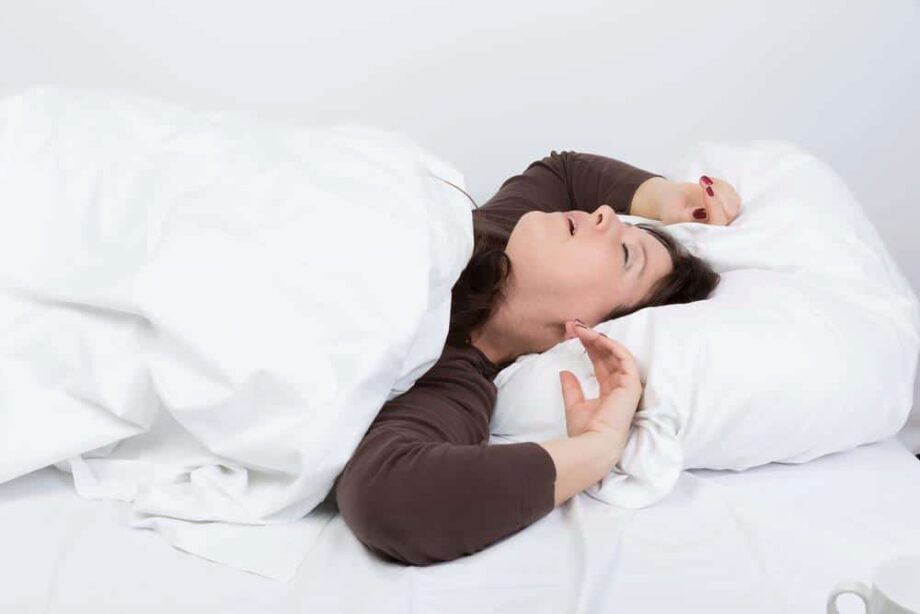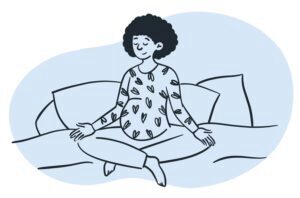How to Get More Deep Sleep
Disclosure: By clicking on the product links in this article, Mattress Nerd may receive a commission fee at no cost to you, the reader. Read full disclosure statement.
While you are no doubt familiar with REM sleep, did you know that there is a type of sleep that is just as important? It is known as deep sleep.
Although only a small fraction of total sleep is spent in this phase, it is highly important to help restore your body’s functions, particularly your memory!
If you wake up exhausted after many hours of sleep, there is a good chance that you did not get enough deep sleep while you slept.

What are the Stages of Sleep?
Now that your curiosity is whetted, what is deep sleep anyway? The best way to understand that is to fully understand the stages we go through during sleep.
Sleep has two major phases: REM and non-REM sleep. Your initial slumbers start with non-REM sleep. You will spend several minutes transitioning from being awake to falling asleep. Both your body functions and your brain waves will slow down, while your muscles relax.
During the second stage, your body temperature will decrease, and your brain waves will slow down but will have occasional bursts of activity.
Next comes the third state where your brain waves are the slowest. This period is referred to as slow wave or deep sleep. There used to be a fourth stage, but it was combined with the third one.
The final stage is rapid eye movement (REM) where your brain waves will be extremely active.
What is Deep Sleep and How Long Does It Last?
During the stage of deep sleep (stage three), your brain waves, breathing, and heart rate become the slowest they will be while you are asleep.
You will find it hard to wake up even if there are loud noises.
This difficulty of waking up is the reason why several sleep disorders are associated with deep sleep. These include night terrors, sleep eating, sleepwalking, and bedwetting.
The first stage can last from 45-90 minutes. It is longer during the first part of the night and then shortens with each sleep cycle.
Related: What is Core Sleep?
Why is it Important?
You may think of learning as something you do when you’re awake, but your brain is highly active during deep sleep. It processes more sugar during deep sleep, which supports short-term and long-term memory. This helps overall learning.
Other benefits of deep sleep include regenerating your cells, restoring energy, building bones and muscles, and strengthening your immune system.
What if You Don’t Get Enough Deep Sleep
Not getting enough deep sleep can have highly negative effects on your body. The loss of slow wave sleep has been linked to a drop in human growth hormone production. The hormone has many functions with a key one being its role in maintaining heart health.
Your brain can be another organ that suffers from a lack of deep sleep! Since it is during deep sleep that you process the day’s information, your brain may not be able to process this information if you don’t get enough deep sleep.
Poor sleep quality is also linked to such severe conditions as stroke, diabetes, heart disease, and Alzheimer’s disease.
Discover the best mattress for you to get the best sleep!
How Much Deep Sleep Does Your Body Need?
About 75% of your sleep is spent in non-REM sleep, while the rest is spent in REM sleep. Of your total amount of sleep, about 13-23% is spent in deep sleep.
The amount of deep sleep you get will decrease as you grow older. If you are less than 30, you may get two hours of deep sleep, while you may only get 30 minutes if you are older than 65. Some seniors get no deep sleep at all.
If you lose several nights of sleep, you will have a sharp rebound in your deep sleep. Not only will you have more slow wave sleep than normal, it will be deeper.
This effect is probably due to a build-up of substances in the brain that induce sleep when you go for a long period without getting enough sleep.
How to Get More Deep Wave Sleep
Subjecting yourself to heat, such as a hot bath or sauna, may promote more sleep wave sleep. However, once you do go to bed, sleeping at 60-67 degrees provides the deepest sleep.
Follow your circadian rhythm! When you stick to your sleep-wake cycle, you are likely to sleep better at night and stay asleep all night. Go to bed early if you are a morning person, and stay up later if you are a night owl.
You are more likely to get high quality sleep if you go to bed at the same time every night, so force yourself to stick to a consistent sleep time.
Your diet can have a large effect on whether you will enter deep sleep. For example, low-carbohydrate diets can cause you to sleep more deeply.
And exercise will always help you to sleep well! (As long as you do it several hours before bedtime.)
Antidepressants can increase the duration of slow-wave sleep periods.
One thing that sleep experts cannot stress enough is the need to eliminate blue light (like phones or computers) when you are trying to fall asleep. Avoiding bright lights at least an hour before bed will help you sleep.
Most people are familiar with white noise machines to help them sleep. However, pink noise can also cause you to spend more of your night in deep sleep. These machines simulate the noise of waves lapping against a beach or leaves rustling in the wind.
Deep Sleep Rejuvenates Your Mind and Body
If you don’t get enough deep sleep, your chances of feeling depressed, gaining weight, or getting sick increase dramatically.
Deep sleep improves your hormones and your physical renewal, making it a vital part of your schedule.
Following the tips in the previous section should help you get enough deep sleep to keep yourself in top form.


